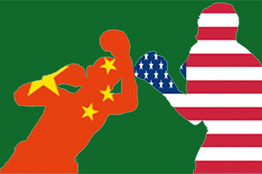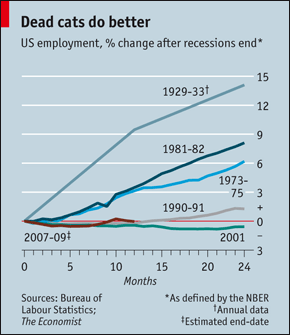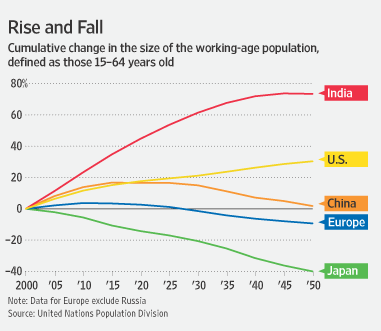Drug war logic repeated on China currency question
 Thursday, September 30, 2010 at 12:01AM
Thursday, September 30, 2010 at 12:01AM  Lemme see: inside every Chinese peasant is an American consumer just waiting to break free!
Lemme see: inside every Chinese peasant is an American consumer just waiting to break free!
Stephen Roach piece in WSJ. He's the former Asia head for Morgan Stanley now back to Yale.
Roach is one of those economists who points out that past experience with Japan says gets a revalued currency won't change our foreign trade deficit with China, which is really with Asia as a whole and has been consolidated by China over the past decade or more through its efforts to become the final assembler of note.
Some bits:
The currency fix won’t work. At best, it is a circuitous solution that would address only one of the many pressures shaping the imbalances between our two nations; at worst, it would lead to a trade war, or risk jeopardizing China’s understandable focus on financial and economic stability.
Besides, in a highly competitive world, there are no guarantees that currency shifts would be passed through to foreign customers in the form of price adjustments that might narrow trade imbalances. Similar fixes certainly didn’t work for Japan in the late 1980s, and haven’t worked for the United States in recent years . . .
Contrary to accepted wisdom, America does not have a bilateral trade problem with China — it has a multilateral trade problem with a broad cross-section of countries.
And why do we have these deficits? Because Americans don’t save. Adjusted for depreciation, America’s net national saving rate — the sum of savings by individuals, businesses and the government sector — fell below zero in 2008 and hit -2.3 percent of national income in 2009. This is a truly astonishing development. No leading nation in modern history has ever had such a huge shortfall of saving. And to plug that gap, we’re left to borrow and to attract capital from lenders like China, Japan and Germany, which have surplus savings.
If Washington were to restrict trade with China — either by pushing the Chinese currency sharply higher or by imposing sanctions — it would only backfire. China could very well retaliate against American exporters, and buy goods from elsewhere (a worrisome development in what is now America’s third-largest export market). Or it could start to limit its purchase of Treasury securities.
The United States would then have to turn to some other nation or nations, at a higher cost, to finance our budget deficits and make up for our subpar domestic savings. The result would be an even weaker dollar and increased long-term interest rates. Worse still, as trade was redirected away from China, already hard-pressed American families would be forced to buy products that are noticeably more expensive than Chinese-made imports.
But Washington remains unwilling to address our unprecedented saving gap, and instead tries to duck responsibility by blaming China. Scapegoating may be good politics, but proposing a bilateral fix for a multilateral problem is just bad economics.
China should stay the course with its measured currency reforms, allowing the renminbi to continue to appreciate gradually and steadily over time. Contrary to the inflammatory rhetoric of China’s critics, this is not “manipulation.” It is a reasonable strategy to anchor the renminbi to the world’s reserve currency, the dollar, in an effort to maintain financial stability in an all-too-unstable world.
True, but by doing so (see reference #2), China is creating a beggar-thy-neighbor bandwagon effect, as Taiwan, Japan and South Korea all start intervening to keep their currencies cheaper, to the point where Brazil's finance minister declares that an "international currency war" has broken out.
Roach then goes on to talk about fixing China's low consumption rate (only 35% of GDP, or about half of the US), but here I think he falls into the trap that Michael Pettis warns about: there is no easy shifting from investment driving most growth to consumption stepping up. In short, anything but a slow redirect gets a crash, and so long as the redirect is slow, it's unlike to effect a serious shift. When you stack those two analyses one on top of the other, you get the feeling that China will go on as it does (addicted to exports) until a crash there forces otherwise. It would seem we've taken sufficient lumps to force the necessary change here--one hopes, which is the big reason why we feel so down on ourselves right now while wildly elevating China in our minds.
But as I like to say, the China model is brilliant until the first big crash.
The thought that prompted the post was that, just like in the drug war, we want our "enemy" to stop exporting so much of that stuff to the U.S., when it's our demand for that stuff and our lack of self-control which is the real issue. But as Roach points out, we don't like to deal with our own issues, and in a classic psychological trip, we transfer our anger over our lack of self-control by blaming our "dealer."
Not exactly the Opium Wars, but you get my drift.
 China,
China,  US,
US,  finance,
finance,  global economy | in
global economy | in  Citation Post |
Citation Post |  Email Article |
Email Article |  Permalink |
Permalink |  Print Article
Print Article 






























